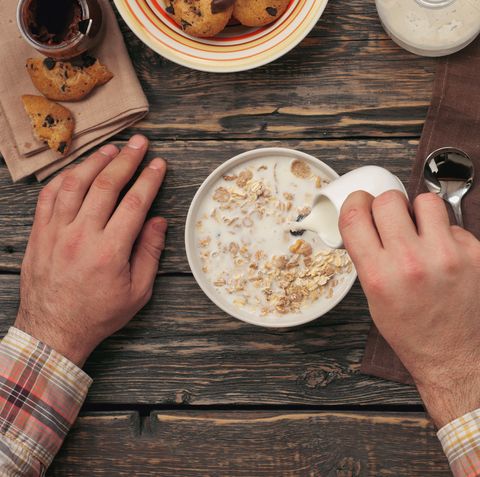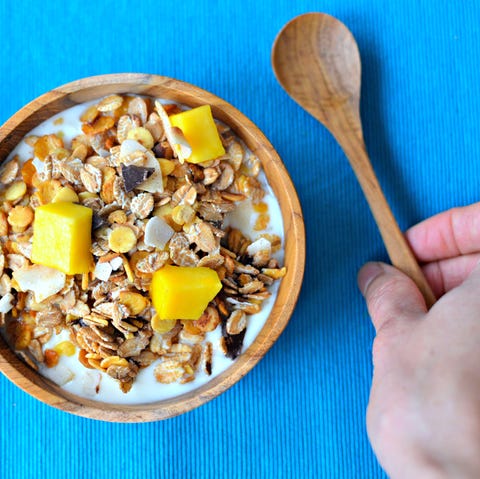
Poll the dietitian community about their oatmeal-eating habits and you might think that eating the whole grain is a requirement for the letters “R.D.” after your name.
Me included.
I make my oatmeal with milk, raisins, banana, hemp seed, and wheat germ—and I eat it at least a couple times a week. I do it for the fiber, which keeps me feeling full. I also do it for the deliciousness.
Yet despite oatmeal being dietitian-approved, and loaded with fiber, and delicious, does that mean that it will help you lose weight?
That’s a little more complicated.
The Health Benefits of Eating Oatmeal

KucherAV
Before we address the possible weight-loss effects of eating oatmeal, it’s important to first understand its nutritional makeup.
One a cup of cooked oatmeal clocks in at only 150 calories, and you get 5 grams fiber (about 18 percent of your daily goal), a serving of whole grains, and a little bit of protein (about 6 grams, which is the same as an egg, to put things in perspective).
Plus, oatmeal contains a good source of other important nutrients like calcium, phosphorus, magnesium, copper, iron, selenium, and potassium.
Research shows that oatmeal eaters—compared to non-oatmeal eaters—have healthier diets.

Eleonora Tuveri
It’s one of the many reasons road warriors, like Jen Fisher, the Chief Wellbeing Officer at Deloitte (a client of mine), travels with it.

“As a frequent traveler, oatmeal is a staple for me,” Fisher says. “You never know what you’ll find in hotels, but carrying packets of plain oatmeal allows me at the very least to make it in my room with the hot water from the coffee pot, though ideally I’d add some berries for added flavor and nutrition.”
All in all, oatmeal is a solid, nutritious choice.
The (Possible) Weight Loss Benefits of Eating Oatmeal

Rasstock
Within oats there’s a special kind of fiber called beta-glucan. This type of fiber, research shows, has been showed to regulate hunger hormones such that you may feel more satisfied after a meal.
This said, there is a notable difference between research that looks at what people eat and what they weigh or how healthy they are, and research that feeds study participants a food in an effort to yield a desired outcome.
And that scientific difference is where the weight loss powers of oatmeal get murky.
Take, for example, one study where overweight and obese women were put on a reduced-calorie diet that included two servings of (fibrous) oatmeal per day. Some of those women didn’t lose any more weight than their counterparts who ate the same reduced-calorie diet that was low in fiber. But for some of the oatmeal-eating-dieters, the extra fiber helped them lose more weight. Similar findings were repeated in another study of overweight women.

valentinrussanov
“Longer study times, however, may show more of a [weight loss] difference,” says Julie Miller Jones, Ph.D., CNS, Distinguished Scholar and Professor Emerita of Food & Nutrition at St. Catherine University. She pointed me to a study of diabetics. The participants that ate oats lost weight, and so did the non-oat-eaters.
But here’s where the difference was: “diabetic subjects who ate oats daily maintained their changes for a year after the study,” says Jones. Their counterparts who ate a healthy diet and no oats couldn’t maintain their weight loss at the one-year mark.
The Bottom Line on Oatmeal and Weight Loss
Eating oatmeal may help you lose weight, particularly if you pair it with a calorie-controlled diet. More valuable, perhaps, is that eating oatmeal regularly will improve your personal nutrition, and also there is very solid research on its cholesterol-lowering and heart health potential.
Source: Read Full Article